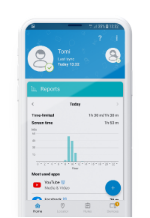In our high-tech world, identity theft is a scary reality and, shockingly, our little ones can be the most at risk.
According to the Federal Trade Commission, cybercriminals often target kids, taking advantage of their squeaky-clean credit records as well as the likelihood that the theft will go unnoticed for a long time. This could lead to a rocky financial road in your child's future. As parents and guardians, we must become knights in shining armor as 73% of families with kids are affected by child identity theft and subsequent fraud. This article will dive into the effects of child identity theft and provide a formula for prevention.
The Effects of Child Identity Theft:
- Credit Chaos: The thief could use your child's identity to open lines of credit, borrow money or rack up large debts, leaving your child with a poor credit rating that could affect their ability to get loans or mortgages in their adult life.
- Criminal Record: In some cases, a thief might use the stolen identity for illegal activities, potentially landing your child with a criminal record.
- Employment: A damaged credit history can influence future job opportunities, as some employers do credit checks as part of their hiring process.
- Emotional Harm: Finding out about identity theft can cause a lot of worry and stress for both the child and the family.
So, how can you protect your child’s identity from being stolen?
There are certain things you can do to make both the online world and your kids´ identity more secure and protected, however hopeless it may sometimes seem. Do not worry, here is a list of practical steps you can take to protect your children:
- Keep Secrets, Secret: Keep sensitive documents, such as birth certificates and social security cards, locked away. Be careful when giving out your child's personal details, and only do so when necessary.
- Teach Your Child: Make sure your child knows about the importance of privacy and the risks of sharing personal information. This should include online manners, spotting phishing scams and understanding the danger when chatting with strangers.
- Watch the Web: Keep an eye on your child's internet use, make sure they're careful about what they post online. Set up privacy settings on social media to help keep their identity safe.
- Check their Credit: Children shouldn’t have a credit report unless an account has been opened for them. Regularly check your child's credit report to ensure that no sneaky accounts exist.
- Security Software: Make sure your child's devices are guarded with the latest security software, including Identity Protection. Regular updates are crucial to protect against new threats.
Navigating the online world is a bit like a merry-go-round; it's a lot of fun, but safety is key! Our little ones might be tech wizards, but their innocence could make them targets for online criminals.
Just as we teach them to tie their shoelaces, we need to teach them about protecting their identity online. Talk to them about the "no-share" list: full names, home addresses and school names are all a no-go. And don’t forget those secret codes we call passwords - they need to be as tricky as a dragon's riddle!
Keep up the conversation about online safety, make it as regular as their favourite bedtime story. Encourage them to share any "Once upon a time, I saw something weird online" moments.
Don't shy away from using the magic of technology to your advantage. Use parental control feature on Windows to keep their online kingdom safe and secure. Regularly updating these defenses is as essential as their yearly flu shot.
Remember, the internet is like their playground. It's our job to ensure they can swing high and slide fast, while always landing safely. By working together, we can make sure our children explore, learn and grow in a safe online world.


